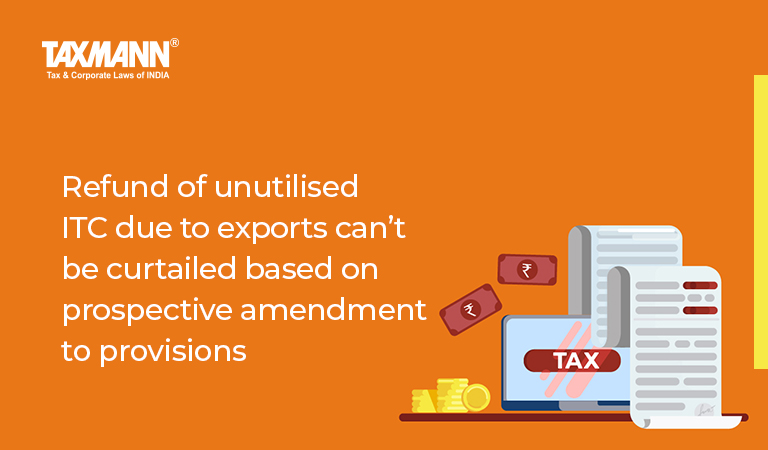Refund of unutilised ITC due to exports can’t be curtailed based on prospective amendment to provisions
- Blog|News|GST & Customs|
- 3 Min Read
- By Taxmann
- |
- Last Updated on 17 February, 2022

Case Details: Lankhorst Euronete India (P.) Ltd., In re - [2022] 135 taxmann.com 146 (Commissioner Appeals - GST - Goa)
Judiciary and Counsel Details
-
- Sarita S. Gadgil, ADDL. Commisioner of State Tax-I
- Gaurav Kenkre, CA for the Appellant.
Facts of the Case
Prior to February 01, 2019, for the purpose of claiming refund of accumulating input tax credit (‘ITC’) on account of zero rated supply, the relevant date for the same was determined under the following two separate clauses of the definition of relevant date under Section 54 of the CGST Act, 2017:
Clause (a) – In the case of goods exported out of India by sea or air, the relevant date would be the date on which ship/aircraft on which goods are loaded, leaves India i.e. Date of Shipping bill.
Clause (e) – In the case of refund of unutilised input tax credit under Section 54(3) of the CGST Act, the relevant date would be end of the financial year in which such claim for refund arises.
With effect from February 01, 2019, the CGST Amendment Act, 2018 substituted the clause (e) to merely cover the scenarios of Inverted Duty structure. Therefore, after the amendment, the relevant date for claiming refund of accumulating input tax credit on account of zero rated supply would be determined as per the clause (a) provided above.
As per the facts of the case, the appellant applied for the refund claim of ITC on account of the export of goods. The date of filing of shipping bill was March 1, 2018. Therefore, as per the amended provision, the relevant date would be 2 years from the date of filing of shipping bill i.e. February 29, 2020. Whereas, in terms of provision prior to the amendment, the relevant date could have been 2 years from the end of the financial year in which such claim of refund arises i.e. March 31, 2020.
The appellant considering that the amendment cannot have retrospective effect, filed the refund claim on June 2, 2020 taking into effect the extension of time limits notified by Notification No. 35/2020-Central Tax, Dated April 3, 2020 (I.e. Notification issued during Covid period for extending time limit for various compliances). The notification provided that any compliance falls between March 20, 2020 to June 26, 2020 would be considered as valid if it is done till June 30, 2020. The refund was rejected by the Department on the ground of time bar relying on amended provisions under the GST law.
Commissioner Appeals Held
In this regard, the Appellant argued before the Commissioner Appeals of Goa GST that such amendment cannot operate retrospectively and it should be applied prospectively. The Commissioner held that the right has accrued to the appellant prior to date of amendment and the same rights would not be curtailed by amendment. Based on various Hon’ble Supreme Court Judgements, the Commissioner held that the legislations which modified accrued rights or which impose obligations or impose new duties or attach a new disability have to be treated as prospective unless legislation intent is clearly to give such enactment a retrospective effect. Therefore, the amended provisions would apply prospectively and not with retrospective effect unless it specifically expresses.
Therefore, order of the Department to reject the refund claim has been set aside and appellant has been given liberty to file fresh refund application.
Disclaimer: The content/information published on the website is only for general information of the user and shall not be construed as legal advice. While the Taxmann has exercised reasonable efforts to ensure the veracity of information/content published, Taxmann shall be under no liability in any manner whatsoever for incorrect information, if any.

Taxmann Publications has a dedicated in-house Research & Editorial Team. This team consists of a team of Chartered Accountants, Company Secretaries, and Lawyers. This team works under the guidance and supervision of editor-in-chief Mr Rakesh Bhargava.
The Research and Editorial Team is responsible for developing reliable and accurate content for the readers. The team follows the six-sigma approach to achieve the benchmark of zero error in its publications and research platforms. The team ensures that the following publication guidelines are thoroughly followed while developing the content:
- The statutory material is obtained only from the authorized and reliable sources
- All the latest developments in the judicial and legislative fields are covered
- Prepare the analytical write-ups on current, controversial, and important issues to help the readers to understand the concept and its implications
- Every content published by Taxmann is complete, accurate and lucid
- All evidence-based statements are supported with proper reference to Section, Circular No., Notification No. or citations
- The golden rules of grammar, style and consistency are thoroughly followed
- Font and size that’s easy to read and remain consistent across all imprint and digital publications are applied



 CA | CS | CMA
CA | CS | CMA
